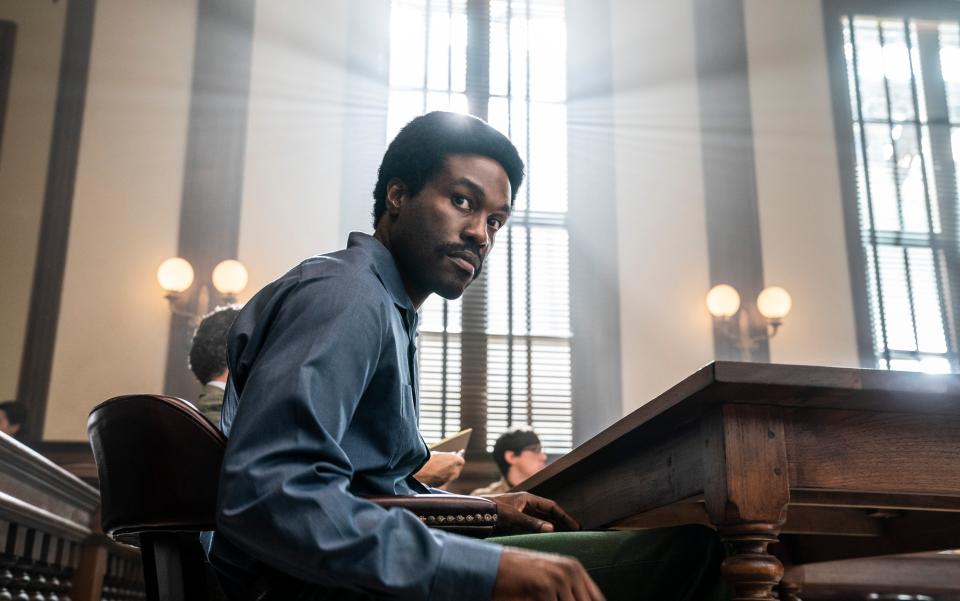The Trial of the Chicago 7 review: A great American injustice reduced to a string of witty repartees

Dir: Aaron Sorkin. Starring: Eddie Redmayne, Alex Sharp, Sacha Baron Cohen, Jeremy Strong, John Carroll Lynch, Mark Rylance. 15 cert, 129 mins
Aaron Sorkin has made the courtroom his hunting ground. It’s the place he’s perpetually drawn back to – in A Few Good Men (1992), his stage adaptation of To Kill a Mockingbird and, now, Netflix’s The Trial of the Chicago 7. To him, this is a sanctified arena of ideas, where words have the power to change the course of history. It’s a showcase, too, for his distinctive, razor-tongued dialogue. But someone with such unwavering faith in the judicial system won’t always be best-placed to tell its stories. That’s especially true of The Trial of the Chicago 7, which marks Sorkin’s second film as both writer and director, following 2017’s Molly’s Game. Here, he reduces a great American injustice into a string of witty repartees. It has all the moral force of someone who spends their days writing sarcastic replies to Trump’s tweets, all the while he tears down democracy piece by piece.
The Chicago Seven were a loose collection of leftist organisers, arrested at the protests outside of the 1968 Democratic National Convention and charged with conspiracy and incitement to riot. They had gathered to voice their opposition to Hubert Humphrey, the Democratic favourite and a vociferous apologist for the Vietnam War. The attorney general at the time, Ramsay Clark, had ruled that the Chicago police had initiated the violence that day. His successor, John Mitchell, seemed to determined to prove otherwise.
The defendants were hardly a united front. Sorkin puts the cardigan-cloaked academics, Tom Hayden (Eddie Redmayne) and Rennie Davis (Alex Sharp) of the Students for a Democratic Society, up against the Molotov cocktail-wielding hippies, Abbie Hoffman (Sacha Baron Cohen) and Jerry Rubin (Jeremy Strong) of the Youth International Party. Then there’s David Dellinger (John Carroll Lynch), a pacifist, suburbanite, and head of the Mobilisation to End the War in Vietnam. The last two defendants, activists Lee Weiner (Noah Robbins) and John Froines (Danny Flaherty) are barely featured – deemed unworthy of being remembered by history.
On the courtroom floor, lawyer William Kunstler (Mark Rylance), in a medieval bard haircut, fights for the Chicago Seven with harried dignity. Sorkin lifts a few flavourful quotes from the court transcripts, including the moment Hoffman declares: “I’ve never been on trial for my thoughts before.” In private backrooms, the defendants bicker over what they should do next. The actors here are perfectly, if rather unimaginatively, cast – Redmayne is wiry and uptight, Baron Cohen chews over his quips like they’re a three-course meal. But Sorkin is far more invested in linguistic tussling (there’s a crucial reveal centred on the use of a pronoun) than in the meat of their arguments. The only conclusion he can come to is that everyone could probably learn from each other – about as unrevolutionary a position as anyone could take. Everything else, meanwhile, takes a back seat to his script. His camera does little more than sit there passively, soaking in the action.

In reality, the Chicago Seven were initially the Chicago Eight – Bobby Seale (a formidable Yahya Abdul-Mateen II), national chairman of the Black Panther Party, was brought in to cause a little fearmongering among the white jurors. He was in Chicago a total of four hours that day. What happened to Seale, who was denied the right to proper representation, is the cruellest chapter in this story, even if his case was eventually declared a mistrial. But he’s a side plot here. The violence against him is shown only in flashes, as if Sorkin were admitting he’s not equipped to handle Seale’s perspective. It’s a little too much of an inconvenient truth for him. The trial of the Chicago Seven wasn’t some great victory for justice and liberalism, as much as Daniel Pemberton’s nauseatingly patriotic score may suggest – it was the sign of a system that may be corrupted beyond repair.


